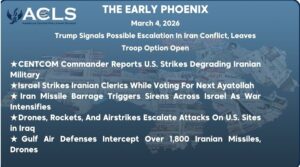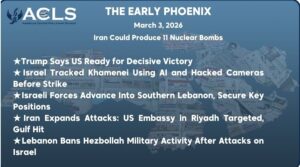THE EARLY PHOENIX
October 8-9 , 2024
★ ISRAEL-HEZBOLLAH WAR
-
Hezbollah Fires 20 Rockets as Israeli Strikes Target Beirut Suburbs
Hezbollah launched 20 rockets from Lebanon towards northern Israel, with no reported injuries, while Israeli forces expanded ground operations in southern Lebanon. Hezbollah claimed to have repelled two Israeli infiltration attempts near the border at dawn. Israeli bombardment of Beirut’s southern suburbs continued, causing massive destruction, particularly in Burj al-Barajneh and Al-Kafaat.
-
Simultaneous Strikes From Hezbollah And Houthis Target Israel
The Houthi movement in Yemen announced on Monday evening that it targeted Israeli sites in Jaffa (central) and Eilat (southern) with two ballistic missiles and several drones. The Israel Defense Forces (IDF) intercepted the missile as over 135 rockets were simultaneously fired from Lebanon. Heavy fire struck northern Israel, with one rocket hitting a home in Kiryat Yam, injuring 12 people, including a woman in her 70s from Haifa. The group also stated that at least 35 Israeli soldiers were killed in clashes near the Lebanese border. In response, the IDF deployed 100 aircraft to target more than 120 Hezbollah sites in southern Lebanon within an hour. Lebanese authorities announced at least 35 people were killed and 150 wounded across Lebanon. The Israeli army announced the elimination of Suhail Hussein Husseini, a senior Hezbollah commander responsible for logistics and arms transfers from Iran.
-
Israeli Army Reports Nearly 50 Soldiers Injured in Combat
The Israeli army reported today that nearly 50 soldiers were injured on the northern and southern fronts within 24 hours. A total of 48 soldiers sustained injuries across various combat areas, with seven suffering serious injuries. The army noted that 30 soldiers were injured at the northern border with Lebanon during clashes, while 18 soldiers were injured in battles in the Gaza Strip.
-
Hezbollah’s Naeem Qasem Delivers First Speech After Safieddine’s Assassination
Naim Qassem, Hezbollah’s deputy leader, publicly requested a ceasefire, signaling Hezbollah’s desire to de-escalate. His speech indicated a shift in Hezbollah’s stance after increasing Israeli pressure and strategic losses. In his first speech following the assassination of Hassan Nasrallah’s successor, Hashem Safieddine, Hezbollah Deputy Naeem Qasem vowed to continue the group’s armed resistance against Israel. He reiterated Hezbollah’s military strength, stating that their capabilities remain intact despite Israeli actions. Qasem expressed strong support for Nabih Berri, the Speaker of Lebanon’s Parliament and leader of the Amal Movement, praising Berri’s political efforts to secure a ceasefire. He framed Berri as a key figure in maintaining Lebanon’s stability and emphasized the importance of unity between Hezbollah and Amal. Qasem stated that any ceasefire must be on terms favorable to the resistance, signaling Hezbollah’s readiness for continued conflict if those conditions are not met. He also condemned U.S. support for Israel, portraying the conflict as part of a larger struggle against Western imperialism.
-
Israeli Official: No Ceasefire Until Hezbollah Withdraws North of Litani
An Israeli official stated that Israel will not cease fighting until Hezbollah withdraws north of the Litani River, dismantles its military infrastructure along the border, and disengages from the conflict in Gaza. The official emphasized that Israel is in a position of strength, bolstered by its intensified ground campaign. The decision also reflects growing opposition from some Lebanese political parties to Hezbollah’s stance in the ongoing conflict.
-
Israeli Prime Minister Urges Lebanese Citizens to Reject Hezbollah
In a direct message to the Lebanese people, Israel’s Prime Minister urged citizens to reclaim their country from Hezbollah and its Iranian backers. He emphasized that Hezbollah, supported by Iran, has transformed Lebanon into a battleground, fueling destruction and chaos. The Prime Minister pointed out that Hezbollah launched over 8,000 missiles at Israel, killing civilians indiscriminately. He called on Lebanese citizens—Christians, Druze, Sunnis, and Shiites—to reject Hezbollah’s control and take back their country. The message highlighted Israel’s success in weakening Hezbollah’s capabilities, including the elimination of its top leadership. He urged Lebanese parents to consider their children’s future and reject the path of war, offering hope for peace and prosperity if Hezbollah is removed from power. The Prime Minister warned of the consequences if Hezbollah continues to drag Lebanon into further conflict, comparing the potential destruction to the devastation in Gaza.
-
Netanyahu Delays Gallant’s U.S. Trip Over Iran Retaliation Plans
Prime Minister Benjamin Netanyahu blocked Defense Minister Yoav Gallant’s scheduled trip to Washington, citing the need for a phone call with President Biden and cabinet approval of Israel’s response to Iran’s missile attack. Gallant had planned to meet U.S. Defense Secretary Lloyd Austin and National Security Adviser Jake Sullivan to discuss coordination on Israel’s potential retaliation against Iran, U.S. support, and regional defense strategies. Tensions between Netanyahu and Gallant have escalated, with Gallant viewed as a more favorable contact by the Biden administration amid growing distrust with Netanyahu. This postponement comes as Netanyahu awaits a promised call from Biden and finalizes Israel’s strategic response.
-
Biden and Netanyahu to Discuss Israeli Strikes on Iran
President Biden is set to speak with Israeli Prime Minister Netanyahu on Wednesday about Israel’s planned strikes on Iran, U.S. officials confirm. This would be their first conversation in two months, as Israel considers major retaliatory strikes following Iran’s recent missile attacks. Israeli officials are weighing airstrikes on Iranian military targets and potential strikes on Iran’s oil infrastructure, though Biden has signaled opposition to the latter. U.S. officials aim to ensure that Israel’s response remains significant but not disproportionate. Israeli politician Avigdor Lieberman voiced concerns about the upcoming call between President Biden and Prime Minister Netanyahu. Lieberman suggested that the call, which he believes was pressured out of the U.S. president, may not yield positive results. He also noted that Biden’s avoidance of a direct conversation with Netanyahu until now is not a coincidence.
-
Israeli Airstrikes Target Iranian Revolutionary Guards in Damascus
Israeli airstrikes hit a building in Damascus housing members of the Iranian Revolutionary Guards and their families. Iran denied the presence of the deputy commander of the Quds Force, Reza Fallahzadeh, and the secretary of the Islamic Jihad Movement, Ziad al-Nakhala, at the targeted site in Damascus. The Assad regime reported that nine civilians, including women and children were killed and 11 others injured.
-
U.S. Authorities Foil ISIS Election Day Attack Plot
U.S. authorities charged Afghan resident Nasser Ahmad Tawhidi with planning an ISIS-linked terror attack on Election Day, November 5. Tawhidi, living in Oklahoma, was arrested after attempting to buy firearms from undercover FBI agents. The FBI uncovered his plans through online monitoring and communications with an ISIS recruiter. He faces charges of providing material support to ISIS and attempting to obtain firearms for a terrorist act, with potential sentences of up to 20 years and 15 years in prison.
=======
★ ISRAEL-HAMAS WAR
-
Hamas Leader Yahya Sinwar Reestablishes Contact with Qatar Over Hostage Deal
Hamas leader Yahya Sinwar renewed communication with Qatar to discuss a potential hostage-ceasefire deal, following rumors he had been killed in an Israeli strike on Gaza. Sinwar had paused negotiations, suspecting Israel’s disinterest in a resolution. He remains firm on his demands, calling for a complete military withdrawal from Gaza. Qatari officials warned that Israel’s assassination policy targeting terror leaders complicates efforts to reach a deal.
-
Israel Intensifies Operations Against Hamas, Targeting Over 70 Sites in Gaza
The Israel Defense Forces (IDF) intensified operations in the Gaza Strip, targeting Hamas positions and infrastructure. Over the past 24 hours, the 162nd Division eliminated 20 Hamas fighters in northern Jabalya, while the 401st Brigade destroyed a weapons depot containing grenades and Kalashnikov rifles. The 460th Brigade neutralized militants after an anti-tank missile attack, and the 252nd Division conducted precision raids in central Gaza. Additionally, Israeli airstrikes killed three Hamas fighters involved in the October 7, 2023 massacre, including Muhammad Rafa’i in Shuja’iyya and Muhammad Zinon and Basel Ahras in Rafah. Israeli forces continue operations to counter a Hamas resurgence in Gaza.
-
U.S. Imposes Sanctions on Hamas Fundraising Network
The United States imposed sanctions on a Hamas-linked international fundraising network on the anniversary of the October 7 massacre. The U.S. Treasury targeted three individuals, a “sham charity,” and the Al-Intaj Bank in Gaza, all identified as key financial supporters of Hamas. A longtime Hamas supporter in Turkiye and nine of his businesses were also sanctioned. Treasury Secretary Janet Yellen emphasized the U.S. commitment to disrupting Hamas’s financial operations amid ongoing threats from the group.
-
Hackers Breach Israeli Sports Websites, Display Hamas Spokesman
Hackers breached several Israeli sports websites, displaying an image of Hamas spokesman Abu Obeida and anti-Israel messages. This cyberattack coincided with the anniversary of the October 7 assault last year. Compromised sites included the official Maccabi Tel Aviv site and various sports federations. The hackers posted slogans like “Gaza Forever, War Has Begun.” Abu Obeida also urged for a significant cyber offensive against Israel in a recent video message.
=============
★ IRAN
-
Iran Sends Tankers Back to Key Oil Facility After Threat Passes
Iran has returned its tankers to the Persian Gulf’s Kharg Island, a key oil export hub, after briefly evacuating them due to fears of an Israeli attack. Two VLCC supertankers from the National Iranian Tanker Company are now loading oil, with additional tankers operating nearby. This signals Tehran’s belief that an Israeli strike on its energy facilities was avoided. U.S. officials previously discussed covert attacks on Iran’s Revolutionary Guard and Khamenei’s assets. Iran’s foreign minister is in Saudi Arabia, seeking Gulf states’ neutrality in a possible conflict with Israel.
-
MI5 Warns of Rising Assassination Plots by Russia and Iran
MI5 Director General Ken McCallum revealed a significant rise in assassination attempts in the UK orchestrated by Russia and Iran, with criminals recruited to carry out attacks. McCallum stated that state-threat investigations have surged by 48 percent over the past year, driven mainly by Russia, Iran, and China. In a public speech, he noted that MI5 and the police have thwarted 20 Tehran-backed plots since 2022, warning that ongoing Middle East conflicts could lead to expanded Iranian aggression in the UK. McCallum highlighted the increasing complexity of threats, combining terrorism with state-backed assassination plots.
-
Iran Denies Israeli Strike on Isfahan Air Base, Citing Defense Tests
Iran’s Islamic Revolutionary Guard Corps (IRGC) denied reports of an Israeli airstrike on Isfahan’s air base following explosions early Tuesday. Speculation arose about an attack on Iran’s nuclear and missile facilities, but IRGC’s Saheb al-Zaman Headquarters confirmed the explosions resulted from defense system tests, not an airstrike. Khatam al-Anbiya Air Defense also issued a statement attributing the loud noises to defense drills. Isfahan, home to key military facilities, has previously been a suspected target of Israeli sabotage due to its strategic importance.
-
Iran’s FM to Visit Saudi Arabia Amid Criticism of Arab States
Iran’s Foreign Minister Abbas Araghchi will visit Saudi Arabia, discussing regional issues amid criticism of Arab inaction on Gaza. Araghchi’s trip seeks to address Israel’s operations in Gaza and Lebanon, calling for collective efforts to stop the violence. He emphasized the importance of regional cooperation, particularly in preventing further Israeli military aggression in Lebanon and Gaza. Iranian media, linked to the Revolutionary Guards, criticized Arab leaders for their passivity regarding Israel’s ongoing actions in Gaza. Araghchi’s Saudi visit follows his diplomatic trips to Lebanon and Syria, reinforcing Iran’s strong support for Hezbollah.
======
★ IRAQ
-
Iraqi Faction Claims Missile Strikes on Israel in Solidarity with Palestinians
The “Islamic Resistance” in Iraq claimed responsibility for missile and drone attacks on five targets in central and northern Israel. The group stated the strikes were in support of Palestinians and Lebanese civilians amid the ongoing conflict with Israel. Using advanced Al-Arqab cruise missiles, the attacks reportedly targeted Israeli military sites. The Israeli army confirmed casualties from a prior drone strike launched from Iraq, with two soldiers killed and over 20 injured. Despite these actions, Iraq’s National Security Adviser Qasim al-Araji rejected involvement in the Israel-Iran conflict, warning of potential risks to Iraq.
-
Iraq Negotiates with Spanish Firm to Establish Railway Line with Iran
Iraq’s government has authorized the Iraqi Railways Company to negotiate with the Spanish company Imathia to implement a Basra-Shalamja railway line connecting Iraq with Iran in the southern region. A government statement indicated that this decision was made during a weekly cabinet session led by Prime Minister Mohammed Shia’ Al-Sudani. Iraq is currently working on enhancing border crossings with Iran by constructing modern railway lines and roadways to boost trade and passenger movement between the two countries.
-
Iraq Begins Exporting Jet Fuel to Global Markets
Iraq has started exporting jet fuel shipments from its ports to international markets. Hamed Younis, Deputy Minister of Oil for Refining Affairs, stated today that the Ministry has commenced exporting between 800 to 1,000 tons of jet fuel daily through its export terminals. He emphasized that Iraq’s jet fuel production meets global standards and specifications.
=======
★ SYRIA
-
Israeli Politician Lieberman Calls for Occupying Syrian Territory
Avigdor Lieberman, leader of Israel’s Yisrael Beiteinu party, urged the Israeli government to send a strong message to the Assad regime by threatening to seize part of Mount Hermon. He stated that if Assad continues to serve as a logistical base for enemies of Israel, military action should be taken to occupy the Syrian portion of Mount Hermon. Lieberman also called for establishing a defensive line inside Lebanon, stretching from the coast near Nabatieh to the Syrian-Lebanese border. He stressed that Syrian President Bashar al-Assad must receive a clear warning through diplomatic and intelligence channels. The remarks were made during a counter-terrorism conference marking the first anniversary of the “Al-Aqsa Flood” event.
-
Russia Balances Interests in Syria While Withdrawing Forces from Daraa
Russia has maintained a delicate balance in Syria, opposing escalation while allowing Israel to strike Iranian and Hezbollah targets freely under a 2016 coordination agreement. Though a key ally of Iran and Hezbollah, Russia has refrained from deploying air defense systems to protect their assets. On Monday, Russian forces withdrew from the strategic military post at Tal al-Hara in Daraa, handing control to the Assad regime forces. The move, linked to rising tensions along the Israeli border, saw Russian forces relocate to Zamrin. Tal al-Hara, a critical observation point, overlooks northern Daraa and Quneitra. Israeli forces observed Syrian military movements in the area and fired flares over Quneitra.
========
★ Egypt
-
Hamas And Fatah Leaders Meet In Cairo To Reach Reconciliation
Leaders from Hamas and Fatah arrived in Cairo for discussions aimed at reaching a reconciliation agreement. According to a report by Yedioth Ahronoth on Tuesday, the delegations are led by prominent Hamas figures, including Khalil al-Hayya, the Deputy Head of Hamas’ political bureau in Gaza, and Hussam Badran, Head of Arab Relations for Hamas. The discussions will explore paths to a consensus, with an upcoming expanded meeting planned to involve all Palestinian factions.
========
★Türkiye
-
Turkiye Blocks HTS Offensive Against Assad Regime Forces
Turkiye has refused to grant Hayat Tahrir al-Sham (HTS), led by Abu Mohammad al-Jolani, approval to launch a military offensive against regime forces in Idlib and Hama. Despite support from some countries, Turkiye warned that such action could worsen civilian displacement in overcrowded refugee camps. Turkiye threatened to close the Bab al-Hawa crossing, a critical supply route for northern Syria, and block the transfer of injured fighters and military supplies. Concerns over the humanitarian impact led Turkiye to issue a stern warning against opening a new front.
-
Turkiye Plans to Build 1,000 Factories in Egypt
Turkiye’s ambassador to Egypt, Salih Mutlu Şen, announced plans to establish two industrial zones and build 1,000 factories in Egypt. A Turkish company signed an agreement with Egypt’s Ministry of Industry to begin construction in 6th of October City and the New Administrative Capital, covering 5 million square meters.
========
★ Gulf Nations
-
Abu Dhabi Leads in Sovereign Wealth as UAE Approves $19.4 Billion Budget
Abu Dhabi now ranks first globally in managing sovereign wealth funds, overseeing $1.7 trillion in assets through entities such as the Abu Dhabi Investment Authority and Mubadala Investment Company, surpassing Oslo’s $1.6 trillion. This achievement underscores the UAE’s growing financial leadership. Simultaneously, the UAE Cabinet, led by Sheikh Mohammed bin Rashid Al Maktoum, approved a record federal budget for 2025 of 71.5 billion dirhams ($19.4 billion). Key allocations include 27.859 billion dirhams for social development and 25.570 billion for government affairs, reflecting the nation’s robust economy and strategic investment in critical sectors.
-
Neom Partners to Build $186 Million Green Concrete Factory
Neom has partnered with Asas Al-Muhailab to build a $186 million green concrete mixing and production complex to support construction for “The Line” city. The facility, valued at 700 million Saudi riyals, will produce over 20,000 cubic meters of green concrete daily and is expected to begin operations next month. It will create over 500 local jobs by 2025, aligning with Saudi Vision 2030’s sustainability and economic goals.
-
Qatar’s Central Bank Reserves Reach $69.5 Billion, Signs Long-Term Naphtha Deal with Shell
Qatar’s Central Bank reserves grew by 4.33% to $69.5 billion by September’s end, reflecting a strong economic position. Official reserves rose to 194.29 billion riyals, with gold reserves seeing a 60.53% increase, totaling 34.08 billion riyals. In parallel, Qatar Energy signed a 20-year agreement with Shell to supply up to 18 million metric tons of naphtha, part of the North Field expansion set to begin in 2026. This agreement, the largest to date, strengthens Qatar’s global energy partnerships.



